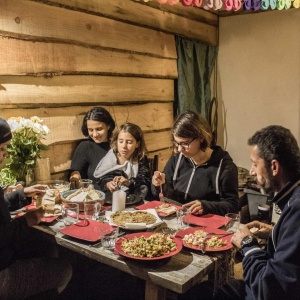
This paper by FCRN member Anke Brons explores the meaning of inclusivity and exclusivity in sustainable diet recommendations, specifically in relation to the experience of Syrian migrants in the Netherlands.
The paper makes several suggestions:
- Move beyond a supply side only perspective on inclusion and exclusion
- Take a critical look at nationally and globally defined dietary guidelines
- Emphasise citizens’ creativity in organizing their food practices
- Acknowledge that migrants are consumers driven by ‘lifestyle’ needs such as convenience
- Identify health as an interesting access point for dietary change
Abstract
The need for a shift toward healthier and more sustainable diets is evident and is supported by universalised standards for a “planetary health diet” as recommended in the recent EAT-Lancet report. At the same time, differences exist in tastes, preferences and food practices among diverse ethnic groups, which becomes progressively relevant in light of Europe’s increasingly multi-ethnic cities. There is a growing tension between current sustainable diets standards and how diverse ethnic resident groups relate to it within their ‘culturally appropriate’ foodways, raising questions around inclusion. What are dynamics of inclusiveness in migrant food practices? And what does this mean towards the transition to healthy and sustainable food? We study this question among Syrian migrants with different lengths of stay in the Netherlands. Our theoretical framework is based on practice theories, which emphasise the importance of socio-material context and of bodily routines and competences. We use qualitative methods, combining in-depth semi-structured life-history interviews with participant observation. Our findings indicate that inclusiveness takes different forms as migrants’ food practices and the food environment change. Regarding health and sustainability in food practices, understandings and competences around particularly fresh food change over time among both short- and long-term migrants, replacing making things from scratch with seasonal products with buying more processed products and out-of-season vegetables and fruits. We conclude that the performances of food practices and their configurations in food environments and lifestyles are dynamic and cannot unequivocally be interpreted as in- or exclusive, but that a more nuanced understanding is required.
Reference
Brons, A., Oosterveer, P. and Wertheim-Heck, S., 2020. Feeding the melting pot: Inclusive strategies for the multi-ethnic city. Agriculture and Human Values, pp.1-14.
Read the full paper here. See also Anke Brons’ FCRN blog post Inclusive sustainable diets in the multi-ethnic city and the Foodsource resource Can we define sustainable healthy eating patterns relevant to different global, regional and national contexts?







Post a new comment »